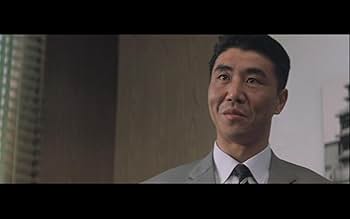A former soldier, reduced to working at a restaurant post-war, becomes a contract killer for the yakuza gangs he's in contact with.A former soldier, reduced to working at a restaurant post-war, becomes a contract killer for the yakuza gangs he's in contact with.A former soldier, reduced to working at a restaurant post-war, becomes a contract killer for the yakuza gangs he's in contact with.
- Awards
- 1 win
- Director
- Writers
- All cast & crew
- Production, box office & more at IMDbPro
Storyline
Did you know
- TriviaARU KOROSHI YA series. #1 of 2 films.
- ConnectionsFollowed by A Killer's Key (1967)
- SoundtracksTsuru kame (aka: Crane and turtle)
Composed by Rokuzaemon Kineya
At the gang boss party
Featured review
"Aru koroshi ya" (A Certain Killer / The Hitman, 1967) is a Japanese yakuza/crime film starring Ichikawa Raizo, possibly the country's biggest movie star at the time. Looking at how popular Raizo was, it's a shame that so many of his later films are generic and predictable genre products, where no effort for artistic creativity is made. This film, by the usually quite lazy genre-worker Mori Kazuo, is better than average. It has a good screenplay by Masumura Yasuzo (one of my favorite directors) and Ishimatsu Yoshihiro, based on a novel by Fujiwara Shinji. It's not a yakuza exploitation film, or an action piece without any nuances, but a stylistic affair, that resembles the films of French auteur Jean-Pierre Melville, especially early on in the film.
Set in the post-war, Ichikawa plays a man who becomes a hitman for an old yakuza family in order to make a living. The plot is quite simple - much like the plots in Melville films - but the way it's told gets your attention. The film starts quietly and patiently, and once we get action, even that is done with restrain. Ichikawa gives a good performance, though the leading lady was a bit over-the-top, affecting the mood of the film too much.
Though this is better than most late Ichikawa, I still am a bit bummed it wasn't made by a more exciting director. Mori is not bad, but doesn't make it too memorable either. Comparing it to the greatest of French cinema doesn't of course help, either. Masumura would have been a good choice, or Shinoda Masahiro who made "Kawaita hana" (Pale Flower, 1964). I recommend this to genre fans, and friends of Raizo, but you can certainly find more gripping Japanese crime narratives from the 60's, as well as tons of worse ones.
Set in the post-war, Ichikawa plays a man who becomes a hitman for an old yakuza family in order to make a living. The plot is quite simple - much like the plots in Melville films - but the way it's told gets your attention. The film starts quietly and patiently, and once we get action, even that is done with restrain. Ichikawa gives a good performance, though the leading lady was a bit over-the-top, affecting the mood of the film too much.
Though this is better than most late Ichikawa, I still am a bit bummed it wasn't made by a more exciting director. Mori is not bad, but doesn't make it too memorable either. Comparing it to the greatest of French cinema doesn't of course help, either. Masumura would have been a good choice, or Shinoda Masahiro who made "Kawaita hana" (Pale Flower, 1964). I recommend this to genre fans, and friends of Raizo, but you can certainly find more gripping Japanese crime narratives from the 60's, as well as tons of worse ones.
- topitimo-829-270459
- Jul 6, 2020
- Permalink
Details
- Release date
- Country of origin
- Language
- Also known as
- De huurmoordenaar
- Production company
- See more company credits at IMDbPro
Contribute to this page
Suggest an edit or add missing content


![Trailer [OV]](https://m.media-amazon.com/images/M/MV5BMjFlY2E4NTctMTBmZS00OWQ3LThkNDYtNzMxYWI2MjEwZDMxXkEyXkFqcGdeQXRyYW5zY29kZS13b3JrZmxvdw@@._V1_QL75_UX500_CR0)



























